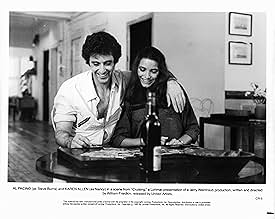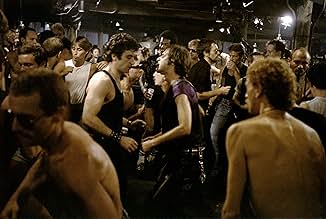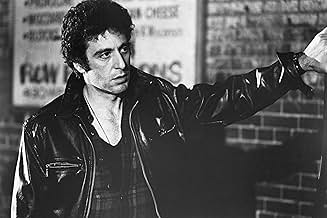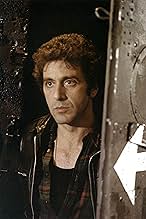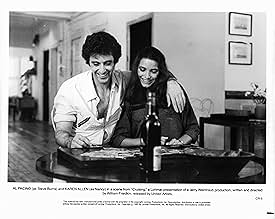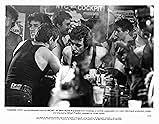Un inspecteur de police s'infiltre dans la sous-culture homosexuelle S&M de New York pour attraper un tueur en série qui s'attaque aux homosexuels.Un inspecteur de police s'infiltre dans la sous-culture homosexuelle S&M de New York pour attraper un tueur en série qui s'attaque aux homosexuels.Un inspecteur de police s'infiltre dans la sous-culture homosexuelle S&M de New York pour attraper un tueur en série qui s'attaque aux homosexuels.
- Réalisation
- Scénario
- Casting principal
- Récompenses
- 5 nominations au total
Ed O'Neill
- Det. Schreiber
- (as Edward O'Neil)
Avis à la une
Viewed today, "Cruising" still elicits intense responses from both Gay and straight viewers alike. Mainstream Gays lament, as many protestors of the film at the time of its release, that it shows a homophobic image of Gay life, depecting them as sex-obsessed. Straights are put off by the frank look at the Gay sex "cruising" culture.
Interesting, however, some of the people involved in the Leather/SM subculture at the time this film was made have praised it for its accuracy of this particular lifestyle -- a pre-AIDS lifestyle concentrated on quick sex that was (and still is) pursued by a segment of the Gay community.
The film does not pretend to depict Gays as a whole. It is just a drama about a police investigation that uses the scene as a background and catalyst for an exploration into how one cop is affected by his work.
Not the greatest film ever made, but certainly a good springboard for discussion about the Gay community's politics, when one fully examines the controversy surrounding the film and the continued debate over public sex and body image in the community.
The strengths of "Cruising" are its use of locales and documentary-style cinematography, as well as the interesting performance from Paccino. In the end, it is hampered as a drama by problems with the narrative structure of the piece that seems to fizzle out in the last act, leading to an intriguing, but inconclusive, finish.
Interesting, however, some of the people involved in the Leather/SM subculture at the time this film was made have praised it for its accuracy of this particular lifestyle -- a pre-AIDS lifestyle concentrated on quick sex that was (and still is) pursued by a segment of the Gay community.
The film does not pretend to depict Gays as a whole. It is just a drama about a police investigation that uses the scene as a background and catalyst for an exploration into how one cop is affected by his work.
Not the greatest film ever made, but certainly a good springboard for discussion about the Gay community's politics, when one fully examines the controversy surrounding the film and the continued debate over public sex and body image in the community.
The strengths of "Cruising" are its use of locales and documentary-style cinematography, as well as the interesting performance from Paccino. In the end, it is hampered as a drama by problems with the narrative structure of the piece that seems to fizzle out in the last act, leading to an intriguing, but inconclusive, finish.
I had the pleasure of seeing this movie recently and I highly recommend it to any people who savor the darker things in life. If I had never seen this movie the reviews left about it everywhere on the net would surely have made me miss it at every opportunity but luckily I only came across them looking for more information after its viewing.
The first thing that really got me was the fantastic soundtrack. This is American punk rock at it's best and most glorious and I cannot think of a more apt context for it than the New York gay S&M scene. This my friends ... is punk-o-rama.
This is not a gay film ... nor is it a porno film ... this is an in your face horror much like William Friedkin's other classic "The Exorcist" ... but not a hammer horror nor a gore filled voyage through some fiery "kissing the devil's ass" hell but a very real slice of a very real life that exists in every major city in the world as well as some smaller ones. This is a film about a world so few know anything about that it is far above common criticism ... yet at the same time the directions and nuances are all too common. I would say that any fans of the movies of David Lynch might enjoy the somewhat lost disenchantment of this flick as it slides further and further into the darkest realms of the grotesque. As well anyone who's enjoyed the backwards pleasures of watching the cult classic "Je'Taime ... Moi Ne Plus" starring Jane Birkin would also find a little gem here.
"Cruisin'" is pure subversive genius.
Futurist-surrealism!
Pure *ART*
The first thing that really got me was the fantastic soundtrack. This is American punk rock at it's best and most glorious and I cannot think of a more apt context for it than the New York gay S&M scene. This my friends ... is punk-o-rama.
This is not a gay film ... nor is it a porno film ... this is an in your face horror much like William Friedkin's other classic "The Exorcist" ... but not a hammer horror nor a gore filled voyage through some fiery "kissing the devil's ass" hell but a very real slice of a very real life that exists in every major city in the world as well as some smaller ones. This is a film about a world so few know anything about that it is far above common criticism ... yet at the same time the directions and nuances are all too common. I would say that any fans of the movies of David Lynch might enjoy the somewhat lost disenchantment of this flick as it slides further and further into the darkest realms of the grotesque. As well anyone who's enjoyed the backwards pleasures of watching the cult classic "Je'Taime ... Moi Ne Plus" starring Jane Birkin would also find a little gem here.
"Cruisin'" is pure subversive genius.
Futurist-surrealism!
Pure *ART*
Too many things wrong with this one to really care for it. The main problem is too much focus on over-the-top depictions of the gay S&M subculture, and not enough on its characters. The undercover cop (Al Pacino), his girlfriend (Karen Allen), and the killer (???) are all ridiculously underdrawn. We don't get enough of what's going through the cop's mind as he's undercover, the girlfriend is only there to serve as a barometer of his heterosexuality, and the killer has some cliché "daddy issues." We do, however, get public fisting ffs.
Especially for 1980, it's unfortunate that this was the window mainstream America got into gay life, as it felt voyeuristic and intended to shock, not serve as a source of understanding or empowerment, at least as best possible as a backdrop to a murder mystery. Maybe the neighbor character, the aspiring writer, was intended to balance some of this out, but he was quickly lost, perhaps by things like the ridiculous man in the precinct house wearing nothing but a jockstrap and walking into interrogations to slap gay suspects around. What the hell was that?
I loved the little bits critiquing the police department at various levels - the beat cops harassing guys on the street and forcing one to perform oral sex, the captain (Paul Sorvino) who too quickly looks the other way, and the chief of detectives who doesn't really empathize with the victims, only wanting to avoid untimely negative publicity. It's too bad more wasn't done with this, but maybe there was a moment of transformation in the captain finding that last body.
The story doesn't really hold together as a police procedural, however. Maybe the film didn't want us to think about Pacino's character having to go home with guys to be effective at his assignment, so a lot of the time, he's just standing around in a bar, watching the raunchy antics of the wild crowd. Early on we're made to understand he's working for the captain only, with no one else knowing about it, but then in one critical scene swarms of cops come to his aid - only to then disappear at the end, when he acts completely alone again. There are also attempts at adding ambiguity into the story in several ways, but they all felt more forced than intriguing.
It's Pacino's character that ends up being the real mystery. You could see this as a man whose bisexuality is awakened, that he goes home with enough men like the guy we see him following out of the park that he loses interest in his girlfriend, and then later knows the repartee well in the climactic encounter. You could also see it as a straight man who has been overwhelmed by what he's seen and done, so much so that his relationship suffers along the way, and even when he's back with her at the end, he's liable to suffering flashbacks and trauma. It was interesting pondering that, but it felt like the film was being less artistic in its ambiguity, and more inhibited by what it felt it could show in a 1980 Hollywood production with a big star like Pacino. Regardless, it was less than completely satisfying, like everything else here.
Especially for 1980, it's unfortunate that this was the window mainstream America got into gay life, as it felt voyeuristic and intended to shock, not serve as a source of understanding or empowerment, at least as best possible as a backdrop to a murder mystery. Maybe the neighbor character, the aspiring writer, was intended to balance some of this out, but he was quickly lost, perhaps by things like the ridiculous man in the precinct house wearing nothing but a jockstrap and walking into interrogations to slap gay suspects around. What the hell was that?
I loved the little bits critiquing the police department at various levels - the beat cops harassing guys on the street and forcing one to perform oral sex, the captain (Paul Sorvino) who too quickly looks the other way, and the chief of detectives who doesn't really empathize with the victims, only wanting to avoid untimely negative publicity. It's too bad more wasn't done with this, but maybe there was a moment of transformation in the captain finding that last body.
The story doesn't really hold together as a police procedural, however. Maybe the film didn't want us to think about Pacino's character having to go home with guys to be effective at his assignment, so a lot of the time, he's just standing around in a bar, watching the raunchy antics of the wild crowd. Early on we're made to understand he's working for the captain only, with no one else knowing about it, but then in one critical scene swarms of cops come to his aid - only to then disappear at the end, when he acts completely alone again. There are also attempts at adding ambiguity into the story in several ways, but they all felt more forced than intriguing.
It's Pacino's character that ends up being the real mystery. You could see this as a man whose bisexuality is awakened, that he goes home with enough men like the guy we see him following out of the park that he loses interest in his girlfriend, and then later knows the repartee well in the climactic encounter. You could also see it as a straight man who has been overwhelmed by what he's seen and done, so much so that his relationship suffers along the way, and even when he's back with her at the end, he's liable to suffering flashbacks and trauma. It was interesting pondering that, but it felt like the film was being less artistic in its ambiguity, and more inhibited by what it felt it could show in a 1980 Hollywood production with a big star like Pacino. Regardless, it was less than completely satisfying, like everything else here.
What strikes me while watching the film, is that truth to reality is really refreshing. No editing in the world can make up to a camera catching a dark, rainy street as they could back in those days when equipment was not developed. Aristoleles claimed that cruelty should be committed outside the scene, that is, in the background. The imagination of the spectator is far more imaginative than a view of the actual event. Therefore, leaving out is stronger in terms of storytelling than showing. Quite the contrary to contemporary movies, I'd say. The advantage of this story is thus the suspense built up on lack of knowledge. There is no flirting with the audience; you do not know in advance who dunnit. There is no flirting with the audience on the task of staging one of the protagonists as a gay either. This is not the greatest movie, but really worth seeing.
Crusing is a very dark psychological thriller from acclaimed director William Friedkin and leading man Al Pacino. Based on true events where a serial killer preyed on gay men part of the S+M gay leather scene in NYC, pre AIDS, where casual sex or cruising was a big thing in that scene. Al Pacino goes deep undercover to attempt to bring down the killer. This film only shows one side of the gay community, which was controversial and brought a polarizing reaction in the gay community in that time. The gay S+M clubs, parks and other areas of NY are the backdrop to this sleazy, violent and downbeat thriller. Al Pacino is excellent, as is the support cast of Paul Sorvino, Joe Spinell and Karen Allen as Pacino's girlfriend. The film is similar in a lot of ways to the Italian giallo films and it seemed to borrow some of its ambiance and style. While most of what happens in the film is pretty ambigious, it seems that as the film progresses Al Pacino seems to identify more with the gay community. This film is very well done and very much in the 70's style, gritty, suspenseful and uncompromising in its presentation. Crusing certainly will not appeal to everyone, but for those that like this kind of film, it is very well done.
Le saviez-vous
- AnecdotesTwo of the notorious gay bars featured in the film - Mine Shaft and Eagle's Nest - eventually barred William Friedkin.
- GaffesWhen the first victim gets stabbed blood is shown running off his shoulder but the knife is spotless.
- Citations
Steve Burns: Hips or lips?
- Crédits fousThe film only opens with the title in large letters, across the screen. It is only at the end where the filmmakers are credited.
- Versions alternativesUK cinema and 1987 video versions were cut by 54 secs by the BBFC. The 1997 Maverick Directors video release was cut by 39 seconds to remove subliminal shots of anal sex during the murder scenes (one of which appears in the film though heavily darkened) and to edit a pan shot of a gay bar interior and shots of a knife being traced over a bound victims body. Although the uncut version was shown by Sky TV the film was resubmitted to the BBFC in 2003 for a FilmFour showing and many cuts were restored apart from a 1 sec edit to remove the subliminal shots. For the initial release on UK DVD in 2008 all the cuts were waived.
- Bandes originalesThree-Day Moon
Performed by Barre Phillips
Meilleurs choix
Connectez-vous pour évaluer et suivre la liste de favoris afin de recevoir des recommandations personnalisées
- How long is Cruising?Alimenté par Alexa
Détails
- Date de sortie
- Pays d’origine
- Langue
- Aussi connu sous le nom de
- Encrucijadas
- Lieux de tournage
- Sociétés de production
- Voir plus de crédits d'entreprise sur IMDbPro
Box-office
- Budget
- 11 000 000 $US (estimé)
- Montant brut aux États-Unis et au Canada
- 19 798 718 $US
- Montant brut mondial
- 19 815 555 $US
Contribuer à cette page
Suggérer une modification ou ajouter du contenu manquant


